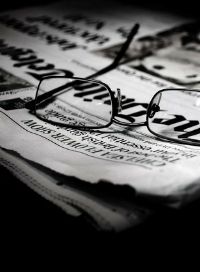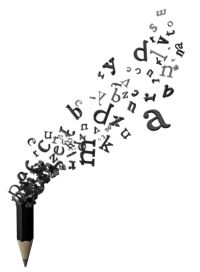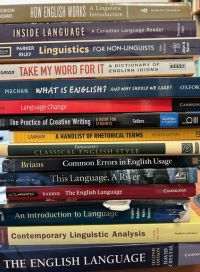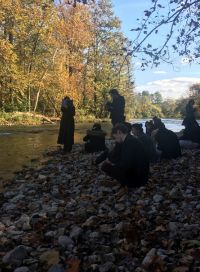- Home
- Undergraduate
- Courses
Writing Studies
Questions?
Writing Studies Courses
featured courses

2203F/G - From Headline to Deadline: Writing for Publication
Develop skills in the preparation, writing, copy-editing, and formatting of publication at every level of writing.

2520A - Write Now! Writers on Writing
Experience the unique opportunity to learn from a wide variety of writers about the craft of writing and the creative life while improving your own writing. ![]() No prerequisites — open to all students!
No prerequisites — open to all students!

2530B - TV or Not TV: Writing for the Television Industry
Fully online and asynchronous! Explore the television and streaming industry through weekly documentary episodes. Learn how to write and pitch creative projects across genres, and prepare for careers in writing and production within the Canadian and U.S. television industries. ![]() No prerequisites — open to all students!
No prerequisites — open to all students!

2550A - The English Language for Creative and Professional Writers
Learn how the English language began, how it evolves, how it functions, and how you can make it work for you.

3225F/G - Writing and AI in the Digital Age
Learn about copyright and remix culture, neuroscience and the impact of online reading, collaborative writing with both humans and AI, and how to craft compelling content for a variety of online media and platforms.

3401F - Dirty Nature Writing
Let nature shape the story in this field-based course taught by UTRCA’s Dr. Tom Cull - writer, advocate, and former Poet Laureate of London.

3402G - Hitting the Right Notes: Song Lyric Writing
Learn essential lyric writing tools while studying master songwriters and workshopping your own lyrics. This course is cross-listed with Music 3732G.

4880F - From Ecopoetics to Cli-fi: Writing in Response to Climate Change
Explore climate change in creative writing! This course supports the development of fiction, poetry, and nonfiction through shared readings, discussions of eco-topics, and supportive workshopping.
Web Registration: If you have a question or concern about registration (Writing course selection, Writing module/program requirements, and related matters), please first read the course descriptions and module/program descriptions as applicable. To view calendar descriptions and recent course outlines ![]() for 2025-26 courses, follow the links below. If your questions are not answered by the information in those documents, or if you wish to apply for Special Permission to take a Writing Studies course, please feel free to contact the Undergraduate Program Director/Writing Studies, Dr. Jamie Johnston, directly by email at jjohns6@uwo.ca.
for 2025-26 courses, follow the links below. If your questions are not answered by the information in those documents, or if you wish to apply for Special Permission to take a Writing Studies course, please feel free to contact the Undergraduate Program Director/Writing Studies, Dr. Jamie Johnston, directly by email at jjohns6@uwo.ca.
*Students registered in FIMS please note: If you have at least 65% in each of MIT 1020E (or both of MIT 1021F/G and MIT 1022F/G) and MIT 1025F/G (total 1.5) you now have the prerequisite for most senior Writing courses.
See Western Academic Timetable for course delivery details.
spring/summer 2026 Courses (Subject to change)
Distance Studies - 6 WEEKS (May 4 - June 12)
2101F - Introduction to Expository Writing
An introduction to the basic principles and techniques of good writing. The course will emphasize practical work and the development of writing skills for a variety of subjects and disciplines. 0.5 course
| Spring/Summer | 2101F / 650 | Fraser | Syllabus |
| Spring/Summer | 2101F / 651 | Syllabus |
2130F - Building Better (Communication) Bridges: Rhetoric & Professional Communication for Engineers
This course introduces students to rhetorical principles and the practices of written, oral, and visual communication in professional engineering contexts. Students will learn strategies for drafting and designing technical and academic documents and for approaching the editing and revision of those documents. 0.5 course
| Spring/Summer | 2130F / 650 | Johnston | Syllabus |
Distance Studies - 12 WEEKS (May 4 - July 24)
2202F - Winning Your Argument: Rhetorical Strategy in a Visual Age
An intensive and practical study of exposition in discursive prose, this course reviews the foundations of grammar, introduces students to the rhetoric of presentation and persuasion, and considers diverse types of prose across multiple disciplines, focusing an analysis of visual rhetoric and argumentation, including websites, advertisements, and other visual media. 0.5 course
| Spring/Summer | 2202F / 650 | Fraser | Syllabus |
FALL/WINTER 2025-26 COURSES (SUBJECT TO CHANGE)
1000-level Courses
1000F/G - Writers' Studio
Students are introduced to the creative process of writing through in-class exercises, peer workshop, analysis of creative texts, journaling, essay writing, and a review of writing mechanics. Students learn strategies for idea generation in a variety of genres, composing a first draft, approaching revision, and effective editing and proofreading. NOTE: ALL SECTIONS OF 1000F/G WILL HAVE AN IN-PERSON FINAL EXAM ON CAMPUS. 0.5 course
| Fall 2025 | 1000F / 001 |
D. Barrick |
| Fall 2025 | 1000F / 002 |
C. Manley |
| Fall 2025 | 1000F / 003 |
A. Wenaus |
| Fall 2025 | 1000F / 004 |
A. Wenaus |
| Fall 2025 | 1000F / 650 (Online) |
D. Barrick |
| Fall 2025 | 1000F / 651 (Online) |
M. Chambers |
| Fall 2025 | 1000F / 652 (Online) |
A. Wenaus |
| Winter 2026 | 1000G / 001 |
A. Wenaus |
| Winter 2026 | 1000G / 002 |
C. Manley |
| Winter 2026 | 1000G / 003 |
D. Barrick |
| Winter 2026 | 1000G / 004 |
A. Wenaus |
| Winter 2026 | 1000G / 650 (Online) |
M. Chambers |
| Winter 2026 | 1000G / 651 (Online) |
M. Chambers |
| Winter 2026 | 1000G / 652 (Online) |
A. Wenaus |
1031F/G - Global Positioning: Introduction to Rhetoric and Professional Communication
This course will introduce students to the rhetorical principles and practices of written and oral communication in professional contexts. Particular attention will be paid to understanding audience, context, and purpose; modes of persuasion; and the negotiation of cultural difference. ALL SECTIONS OF 1031F/G WILL HAVE AN IN-PERSON FINAL EXAM ON CAMPUS. 0.5 course
| Fall 2025 | 1031F / 001 |
T. Freeborn |
| Fall 2025 | 1031F / 650 (Online) |
B. Eayrs |
| Winter 2026 | 1031G / 001 |
T. Freeborn |
| Winter 2026 | 1031G / 650 (Online) |
B. Eayrs |
2000 and 2100-level Courses
Speech 2001 - The Major Forms of Oral Discourse
For effective communication of ideas: Public Address, with basic purposes; Group Discussion; Debate; Voice and Diction; Interpretative Reading. 1.0 course
| Fall/Winter | 2001 / 001 |
J. Johnston |
| Fall/Winter | 2001 / 002 |
M. Aylen |
2101F/G - Introduction to Expository Writing
An introduction to the basic principles and techniques of good writing. The course will emphasize practical work and the development of writing skills for a variety of subjects and disciplines. 0.5 course
| Fall 2025 | 2101F / 001 |
J. Johnston |
| Fall 2025 | 2101F / 650 (Online) |
K. Fraser |
| Fall 2025 | 2101F / 651 (Online) |
K. Fraser |
| Winter 2026 | 2101G / 001 |
J. Johnston |
| Winter 2026 | 2101G / 650 (Online) |
K. Fraser |
| Winter 2026 | 2101G / 651 (Online) |
K. Fraser |
| Winter 2026 | 2101G / 652 (Online) |
K. Fraser |
2111F/G - Writing in the World: Introduction to Professional Writing
This course will introduce students to various genres of workplace writing such as letters, memos, and reports. Topics include: employment communications (application letters and resumes); business writing style; positive, negative, and persuasive messages; cross-cultural communication; oral communication. 0.5 course
| Fall 2025 | 2111F / 001 |
T. Freeborn |
| Fall 2025 | 2111F / 002 |
M. Aylen |
| Fall 2025 | 2111F / 650 (Online) |
C. Lee |
| Fall 2025 | 2111F / 651 (Online) |
B. Eayrs |
| Fall 2025 | 2111F / 652 (Online) |
M. Arntfield |
| Fall 2025 | 2111F / 653 (Online) |
M. Arntfield |
| Fall 2025 | 2111F / 654 (Online) |
T. Freeborn |
| Winter 2026 | 2111G / 001 |
M. Aylen |
| Winter 2026 | 2111G / 002 |
M. Aylen |
| Winter 2026 | 2111G / 650 (Online) |
C. Lee |
| Winter 2026 | 2111G / 651 (Online) |
M. Arntfield |
| Winter 2026 | 2111G / 652 (Online) |
T. Freeborn |
| Winter 2026 | 2111G / 653 (Online) |
T. Freeborn |
| Winter 2026 | 2111G / 654 (Online) |
C. Lee |
| Winter 2026 | 2111G / 655 (Online) |
T. Freeborn |
2130F/G - Building Better (Communication) Bridges: Rhetoric & Professional Communication for Engineers
This course introduces students to rhetorical principles and the practices of written, oral, and visual communication in professional engineering contexts. Students will learn strategies for drafting and designing technical and academic documents and for approaching the editing and revision of those documents. 0.5 course
"Writing 2130F/G is one of the most important courses in Western’s curriculum that any aspiring engineer will take. In all types of engineering, the successful outcome of a project is directly related to how effectively every team member communicates with each other and with the project stakeholders. As a professional in your chosen field, you will be solicited for advice and direction by clients, colleagues, superiors, and the public. Key skills developed in the course include knowing your audience and guiding the reader through the document. Speaking from experience, I have found that taking the time to incorporate key communication concepts is crucial to having your work approved by superiors and authorities in a more timely manner."
-- Markus Eichenbaum, Development Engineering Technologist, City of Mississauga, MESc (2020), Civil & Environmental Engineering
| Fall 2025 | 2130F / 650 (Online) |
J. Johnston |
| Winter 2026 | 2130G / 650 (Online) |
J. Johnston |
2131G - No Bones About It: Writing for the Sciences
Writing in the Sciences introduces students to the basic principles and genres of writing required for science students in their undergraduate careers: lab reports, summaries of scientific research, and scientific review essays. The course will focus on drafting and revising various reports written on scientific topics. 0.5 course
| Winter 2026 | 2131G / 650 (Online) |
A. Schneider |
2200 and 2500-level Courses
2202F - Winning Your Argument: Rhetorical Strategy in a Visual Age
An intensive and practical study of exposition in discursive prose, this course reviews the foundations of grammar, introduces students to the rhetoric of presentation and persuasion, and considers diverse types of prose across multiple disciplines, focusing an analysis of visual rhetoric and argumentation, including websites, advertisements, and other visual media. 0.5 course
| Fall 2025 | 2202F / 650 (Online) |
K. Fraser |
2203F/G - From Headline to Deadline: Writing for Publication
The course will improve writing intended for various forms of publication, including media releases and public letters, reviews and reports, newspaper and magazine articles. Students will develop skills in the preparation, writing, copy-editing, and formatting of materials for publication, focusing on effective organization at every level of writing. 0.5 course
| Fall 2025 | 2203F / 650 (Online) |
M. Chambers |
| Winter 2026 | 2203G / 650 (Online) |
M. Chambers |
2204F - Short Flicks: An Introduction to Screenwriting
In this course students will analyze short and feature film scripts, workshop their own scripts and respond to the scripts of other students, and draft and revise a 15 minute short film script. Topics will include image, three-act structure, dialogue, character development, theme, scene construction, and point of view. 0.5 course
| Fall 2025 | 2204F / 650 (Online) |
B. Sage |
2209G - Visual Information Packaging: Document Design
This course introduces students to principles of document design and methods of integrating visual and verbal information in print documents such as brochures, manuals, and flyers. Students will apply these principles to a variety of design projects using the computer lab facilities. 0.5 course
| Winter 2026 | 2209G / 650 (Online) |
D. Barrick |
2210G - GrammarPhobia Demystified: Contemporary Grammar for Writers
A study of how the English language works in practice, the course will include consideration of writing processes and the practical application of various theories of rhetoric and syntax. Students will analyse and imitate a variety of types of writing samples, and will develop a sophisticated understanding of writing in English. 0.5 course
| Winter 2026 | 2210G / 650 (Online) |
B. Eayrs |
2214G - Memoir, Memories, and Disclosure: Creative Non-Fiction
This course is designed for students who wish to write what's true in the form of personal essay, memoir and literary journalism. We will explore how writers use narrative techniques and structure to create essays both to the traditional forms and challenge them in unexpected, important and engaging ways. 0.5 course
| Winter 2026 | 2214G / 001 |
C. Manley |
2215F - Encoding Persuasion: Rhetorical Theory
This course introduces students to basic precepts of rhetorical theory, and their application to communication analysis and the practice of writing. Topics will include rhetorical argumentation, 'publics' theory, and conceptions of rhetoric as both a social practice and a method. 0.5 course
| Fall 2025 | 2215F / 650 (Online) |
B. Eayrs |
CANCELLED 2216B - Technical Writing & Editing
This course will teach you how to create works and to edit the writing of others in different technical genres. To produce technical documents, you will combine analysis, organization, and design; to edit them, you will assess the correctness and consistency of format, style, and mechanics. 0.5 course
| Winter 2026 | 2216B / 001 | T. Freeborn |
2218G - To Make a Long Story Short: Introduction to Writing Short Fiction
In this course students will develop not only fiction writing ability, but also critical reading skills. The short story will be the focus of the course. Students will produce their own short fictions based on professional models, instructor guidance, and class discussion. 0.5 course
| Winter 2026 | 2218G / 001 |
A. Schneider |
2220F - Introduction to Writing Poetry
As students develop their own poetic voice, they will explore a range of contemporary styles and techniques. In addition to class workshops, craft discussions, and writing exercises, this experiential course will immerse students in current small press publishing trends, including hands-on editorial opportunities and direct engagement with London’s poetry community. 0.5 course
| Fall 2025 | 2220F / 001 |
D. Barrick |
2222F - Food Writing
In the novel "Like Water for Chocolate", Mexican author Laura Esquivel reveals the powerful force of food to educate, and to influence emotions, culture and life. In this course students will practice food writing (through memoir, history, reportage, biography and narrative) while developing specific research methods to understand food systems. 0.5 course
| Fall 2025 | 2222F / 650 (Online) |
M. Chambers |
2223F - Fashion Writing: Elements of Style
Using high fashion magazines as well as select books, film/video, and internet resources, this course covers the basic areas of fashion writing (review, trend reports, profiles, etc.) and explores how fashion can be used as a lens to discuss other areas of cultural and social significance. 0.5 course
| Fall 2025 | 2223F / 001 |
C. Manley |
2520A - Write Now! Writers on Writing
Through a series of guest lectures by contemporary writers, this course explores the art, craft, and process of creative writing in a variety of genres. Course topics include inspiration, overcoming creative blocks, revision, social media, publishing, literary citizenship, and the writing life. Learn more about this course! 0.5 course
| Fall 2025 | 2520A / 001 |
A. Schneider |
NEW FORMAT! 2530B - TV or Not TV: Writing for the Television Industry WEEKLY DOCUMENTARY-STYLE EPISODES
This course teaches students how to write and pitch creative projects reflecting today’s dominant television broadcast models. By exploring a variety of formats and genres, this course will also help prepare students for professional careers in writing and production in the television industry in both Canada and the United States. Watch the trailer ![]() 0.5 course
0.5 course
| Winter 2026 | 2530B / 650 (Online) |
M. Arntfield |
2550A - The English Language for Creative and Professional Writers
This course will teach you how to write more effectively in English. You’ll learn about rules and when to ignore them, about sound, about systems, about word order, about meaning, and about the importance of context and situation. This is not a remedial or introductory grammar course. 0.5 course
| Fall 2025 | 2550A / 001 |
M. Fox |
3000-level Courses
3225F/G - Writing and AI in the Digital Age
This course equips students with writng tools for the digital age. Topics include copyright and remix culture, neuroscience and the impact of online reading, collaborative writing with humans and artificial intelligence, and how to craft compelling content for a variety of online mediumds and platforms, including social media and websites. 0.5 course
| Fall 2025 | 3225F / 650 (Online) |
C. Lee |
| Winter 2026 | 3225G / 650 (Online) |
C. Lee |
3228G - Concept to Product: Publishing
This is a workshop course in which students work in teams to develop an issue of a journal, a season of chapbooks, or a print anthology. It is of particular interest to students considering a career in print/digital publishing. The roles of managing editor, copy editor, web designer, book designer, and writer are part of the classroom experience. 0.5 course
| Winter 2026 | 3228G / 001 |
A. Schneider |
3401F - Dirty Nature Writing
What does it mean to write about nature in an age of climate change, mass extinction, and environmental degradation? In this course, we track down nature in all its complex entanglements. Prepare to get your hands dirty: each class is organized around hikes, field trips, guest lectures, or environmental action. 0.5 course
| Fall 2025 | 3401F / 001 |
T. Cull |
3402G - Hitting the Right Notes: Song Lyric Writing (cross-listed with Music 3732G)
Do you want to write lyrics in your favourite musical genre—blues, rock, folk, pop, hip hop, and others? Learn essential lyric writing tools including imagery, repetition, metre, persona, and storytelling structure while studying master songwriters and workshopping your own lyrics. No previous music theory experience required. 0.5 course
| Winter 2026 | 3402G / 001 |
D. Barrick |
3403G - Experimental Writing
In this course, students will develop innovative projects by exploring experimental writing movements and methods. By investigating groundbreaking styles from Futurism, Dada, Surrealism, and Situationism to OULIPO, Postmodernism, Xenopoetics, internet subcultures, and memes, students will workshop unique literary forms of their own that will challenge conventional modes of expression. 0.5 course
| Winter 2026 | 3403G / 001 |
A. Wenaus |
3600G - Fantasy Writing
Students in this course will complete a plan for a full-length fantasy novel, focusing on aspects of world-building (including language creation), the use and transformation of common fantasy motifs, various ways to structure the narrative and tell the story, and how to devise the most affective and climactic scenes. 0.5 course
| Winter 2026 | 3600G / 001 |
M. Fox |
3640F - Crime Writing: Black Dahlias, Red Herrings, and Tequila Sunrises
This course introduces students to the process of writing crime fiction for a variety of media. Drawing on classic works, students will also learn about the criminal mind and investigative procedure as they create realistic portrayals of the genre's archetypal crimes, including murder, ransom kidnapping, and the theft of antiquities. 0.5 course
| Fall 2025 | 3640F / 001 |
M. Arntfield |
3824G - Feature Film Writing
This course explores the writing of feature-length screenplays via practical workshops. Classes focus on three-act structure and plot, scenes and sequences, character development, genre, and theme. Students will pitch their story for a feature film, write an opening scene, and complete the first act of their screenplay. 0.5 course
| Winter 2026 | 3824G / 650 (Online) |
B. Sage |
4000-level Courses
4880F - Seminar in Creative Writing: From Ecopoetics to Cli-fi: Writing in Response to Climate Change (cross-listed with English 4871F)
Focusing on the topic of climate change, this course will encourage and support students to develop a sustained work of fiction, poetry, or creative nonfiction through shared reading, writing, and workshopping. We will examine how other creative writers grapple with climate change, discuss topics such as mourning, extinction, care, activism, and hope, and explore our own relations to the land and creatures we live with and among. Regular writing exercises and workshopping will allow us to try new approaches, support each other’s writing, and deepen and strengthen our creative work. 0.5 course
| Fall 2025 | 4880F / 001 (DRAFT) |
M. Bassnett |
4998G - Re-visioning Self: Creating Your Professional Portfolio
In this half-course students will write new documents and revise documents written in previous Writing classes to include in a portfolio of their work. The portfolio will be both online and printed. Class time will be devoted to a combination of lecture and writing workshop. 0.5 course
| Winter 2026 | 4998G / 650 (Online) |
B. Eayrs |
4999E - Creative Writing Thesis
Individual instruction in selection of a topic, preparation of materials, and writing of a creative writing thesis. To take this course, students must apply to the Director of Undergraduate Studies, Writing Studies. Restricted to students in fourth year of an English Honours Specialization module. 1.0 course
Please fill out the Agreement/Consent Supervisor Form and return to writing@uwo.ca.
| Fall/Winter | 4999E / 001 | Various |
Course listings are subject to change. See Western Academic Timetable for date, time, and location of specific courses. See Undergraduate Sessional Dates for more details and deadlines.




